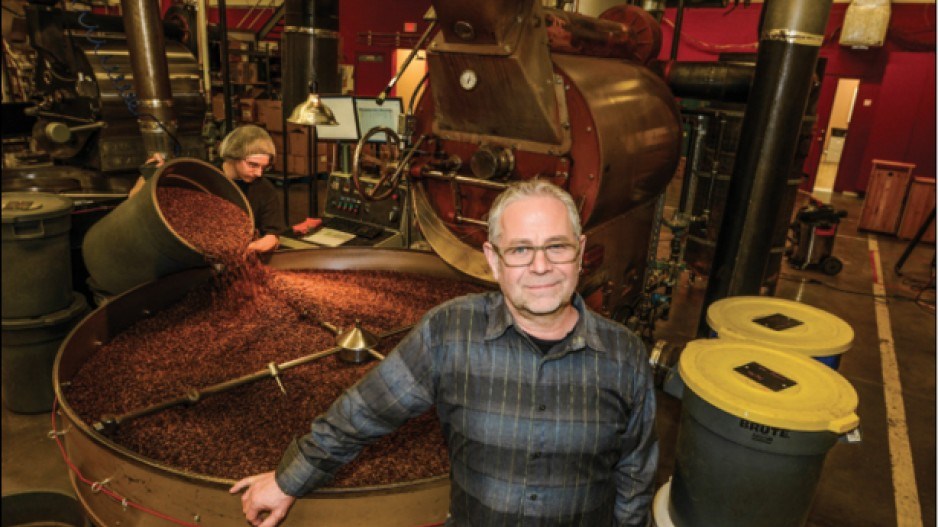Coffee giants Starbucks (Nasdaq:SBUX), Maxwell House and Keurig (Nasdaq:GMCR) recently responded to a sharp increase in the price of coffee by raising prices. But smaller local roasters in the Vancouver area say their practice of buying directly from farmers has largely insulated them from the volatile coffee commodity market – for now.
“We buy at least a year in advance, so those prices are fixed in place,” John Neate, owner of JJ Bean Coffee Roasters, told Business in Vancouver.
“When we go to [renew contracts in January or February], we know there's going to be a price increase because the replacement stocks we've been getting in … have gone up significantly – between $0.30 and $0.40 a pound.”
Mickey McLeod, owner of coffee roaster Salt Spring Coffee, has also avoided the pressure to raise prices because of the one- to three-year agreements his company has made with farmers and coffee co-operatives.
“If [the high prices continue] for a long period of time it's certainly going to affect us,” McLeod said.
The per-pound price of coffee futures rose from US$1.20 in February to a high of nearly US$2.20 in May. At press time, it was trading at US$1.92 on the ICE Futures exchange.
A drought in Brazil, the world's largest producer of coffee, is the main reason prices have spiked. But the growing popularity of the commodities markets is also a factor, said Frank Dennis, CEO of Burnaby-based Ten Peaks Coffee Co. (TSX:TPK).
“As the equities market gets a little bit long in the tooth, institutional investors are looking around for opportunities that are ripe for returns and growth,” said Dennis, whose company owns Swiss Water Decaffeinated Coffee Co.
“Commodities went out of favour for a few years, and this is coming back into shape again.”
That has resulted in intense investor interest and speculation based on every piece of news coming out of coffee-growing regions, contributing to more volatility than Dennis has seen in recent years.
His company buys all of its coffee on the spot market, often on behalf of customers.
“We take ownership of the coffee before they own the coffee,” Dennis explained.
Ten Peaks then sells the decaffeinated coffee to its customers, which range from Tim Hortons (TSX:THI) to JJ Bean.
Unlike small roasters JJ Bean and Salt Spring Coffee, Ten Peaks Coffee is directly affected by the New York coffee commodity market.
“I'm seeing daily movement: today I saw a $0.10 move in the New York market,” Dennis said. “If someone called four hours ago, their price would have been $0.10 a pound less than it is now.”
Like most dealers in commodities, Ten Peaks attempts to mitigate that uncertainty by hedging all of the coffee it buys. Dennis said the company also needs to have a “big balance sheet” and deal with a bank that understands the variables Ten Peaks faces.
Dennis expects the volatile market to settle down after the Brazilian coffee harvest finishes in about 12 weeks because there will be less crop news to fuel speculation. However, analysts expect the high prices to continue into next year because of long-lasting damage to Brazilian coffee plants.
Buying directly from farmers means that Neate and McLeod, who sell high-quality blends, organic and fair trade, generally pay more for their coffee than they would on the commodity market. But Neate said that higher price comes with more stability, both for coffee growers and for the roasting companies.
“I'd love it if the commodity market wasn't part of the dictating factor in the market for buying coffee in the organic, fair-trade world,” McLeod said, noting that speculators have driven up the price of all coffee. “Truly there should be a different strategy.”



